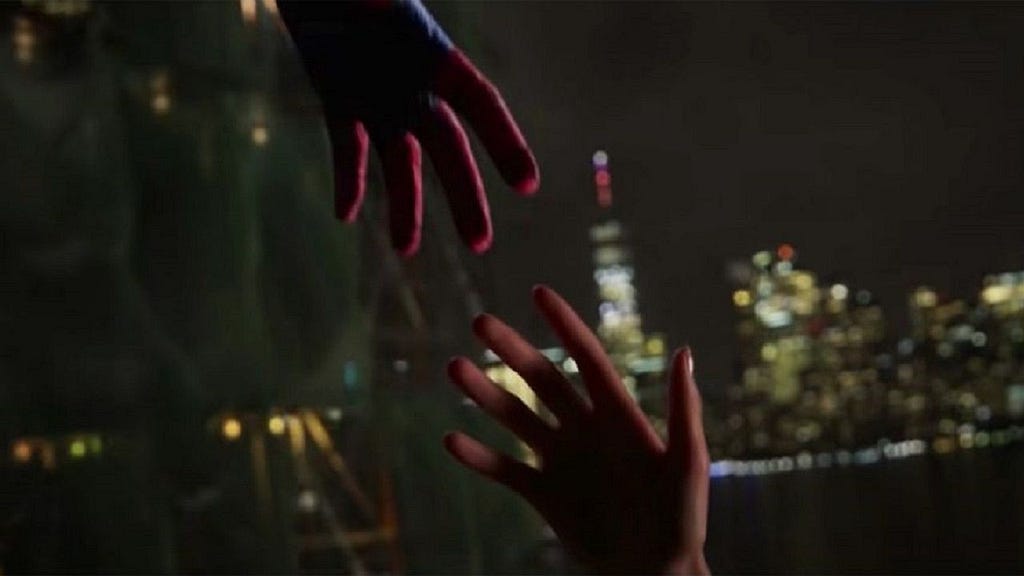
How “Spider-Man: No Way Home” successfully illustrates the nuances of true heroism. Photo Credit: Columbia Pictures/Marvel Studios
Photo Credit: Columbia Pictures/Marvel Studios
I’ve seen Spider-Man: No Way Home four times. While I was blown away with feelings of nostalgia and lots of epic superhero content on the first viewing, it took a few more sit-throughs to let the true essence of the narrative sink in. I think that’s the sign of a great story: the unfolding of a deeper message with every watch, listen or read through. In many ways, I believe that No Way Home is one of the most successful displays of cinematic heroism we’ve seen in a long time.
“A culture cannot evolve without honest, powerful storytelling. When a society repeatedly experiences glossy, hollowed-out, pseudo-stories, it degenerates. We need true satires and tragedies, dramas and comedies that shine a clean light into the dingy corners of the human psyche and society.” ~ Robert McKee, Story (p.13)
Like every millennial, I grew up watching the legendary Sam Raimi Spider-Man trilogy. I remember thinking that there was something so pure and honest about Tobey Maguire’s portrayal of the Stan Lee comic character. Years later, it’s wonderful to see how that same essence has transcended the original trilogy while at the same time remaining consistent. Marc Webb’s The Amazing Spider-Man films and the most recent franchise starring Tom Holland all have that wholesome, “need to help others,” vibe. But No Way Home pushes past the bounds of traditional cinematic heroism to achieve something even more meaningful and complex: sacrificing oneself for the good as well as the undeserving.
Strength in unity and saving people from themselves
Just before the plunge into the third-act battle of Spider-Man: No Way Home, the three “Spider-Men” Andrew Garfield, Tobey Maguire, and Tom Holland, share a powerful moment that’s been with Marvel since 1962. It’s the iconic message that Uncle Ben delivers just before he dies: “with great power comes great responsibility.” It also bears similarities to Luke 12:48 in the Bible, which states, “from everyone who has given much, much will be demanded.” It’s the base standard that every hero must abide by, though it can be difficult to endure. Uncle Ben’s philosophy starts to become realized when Peter finds himself responsible for the lives of his oppressors, although he hasn’t yet learned the phrase by this point in the film. This is the start of his moving towards a practical understanding of “with great power comes great responsibility.” He opposes Doctor Strange’s rationalization of letting the bad guys succumb to their fates for the sake of keeping the universe in balance. Instead, he realizes that it’s his destiny to save the villains from themselves and make them “whole again.”
Doctor Strange’s philosophy of “necessary sacrifice” goes against Peter’s belief that everyone is worth redemption, even those that appear evil or irredeemable. This moral dilemma has been explored in past Spider-Man films. For example, Peter Parker wished he could save the Green Goblin/Norman Osborn (2002), Dr. Otto Octavius (2004, although this was sort of an allowed sacrifice as Otto chose to take down his own machine), Eddie Brock/Venom (2007), and Harry Osborn (2007), but he didn’t have the means or know-how at the time. This theme of “saving the villain” could also be compared to Batman’s dilemma of “why not just kill the Joker?” The reason Batman won’t is because murder/killing goes against the intrinsic nature of a hero. But No Way Home takes things a step further as it recognizes that “saving” is much different than simply “not killing.” With this new Spider-Man film, the character of Peter is able to fulfill his original desire to save everyone, including the lost.
“But I tell you, love your enemies and pray for those who persecute you”. –Matthew 5:44Crossing the threshold of suffering to achieve something greater
As much as it tore me apart when Aunt May died in No Way Home, it was clear that perhaps the moment is an integral part of Spider-Man’s journey. A sort of “right of passage” he must experience to mature into the hero he’s meant to be. After she’s hit with the Green Goblin’s glider, Aunt May recites Uncle Ben’s famous words just before she passes. But unlike the previous films, it was touching to see the other, older (wiser and more experienced), Spider-Men supporting the current Spider-Man through the loss. Together they realize that the death of Uncle Ben (and in this case, Aunt May) is a threshold that must be passed as Peter needs to grow to understand great power and great responsibility on his own. It’s like passing a torch of wisdom. By this singular moment being shared amongst the three Spider-Men across the multiverse, No Way Home is realized as the new peak of the Spider-Man legend/myth.
“No great wisdom can be reached without sacrifice.”― C.S. Lewis, The Magician’s NephewThe need for and power of true friendship
In No Way Home, Ned, M.J., and Peter share a remarkable friendship that’s been tried and tested throughout the previous movies. I appreciate that the filmmakers took two movies to develop these relationships. By this time, we’ve seen the friends tested in everything from high school drama, to extreme mortal situations. I love that Ned and M.J. play a pivotal role in Peter’s trials as Spider-Man by the third film. The two help Peter find and capture the Multiverse villains as well as assist him in his ethical/philosophical conflicts with Doctor Strange. It’s a great counter to the isolated, vigilante trope most heroes must endure. It also expands the role of the romantic interest. Peter and M.J. may be a couple, but they share something much deeper than a solely romantic connection: true friendship.
Throughout the story, Peter learns how to depend on others. He‘s forced to come to terms with the fact that he can’t overcome anything alone, especially after losing his only family and butting heads with an all-powerful wizard. He needs M.J. and Ned to help him reform the lost souls of Spider-Man’s most notable enemies from the previous films (Doc Ock, Sandman, Green Goblin, Electro, The Lizard). He must stand in sync with the other Peters in order to win the final battle. He needs to convince Doctor Strange that villains can become good again and that they must work together to save the world. Lastly, despite his greatest loss, Peter must also recognize that only friendship and love can truly overcome adversity. Even in the face of those who have wronged him the most.
“Do I not destroy my enemies when I make them my friends?”― Abraham LincolnA twist on “the ultimate sacrifice”
Just when all seems lost and the world is literally caving in, Peter Parker makes the ultimate sacrifice. While he faces a metaphorical death instead of a physical one when he asks Doctor Strange to make everyone in his reality forget him, the consequences are no less dire. By the end of the film, Ned and M.J. fail to remember Peter at all, along with the rest of the world. But in many ways, their lives are better for it. They’re both accepted into the school of their dreams, which wasn’t possible when the world first found out Peter Parker was Spider-Man. Peter sinks into deeper anonymity than before and continues to watch over the city from afar. He becomes the ultimate vigilante, as the world forgets Peter Parker’s existence.
The reason I believe the writers of the film chose this direction is because Peter Parker must lose his civilian identity to fulfill his destiny of becoming a “new,” more fulfilled Spider-Man. He no longer has to live a double life and can now reach his ultimate purpose. He must abandon his ordinary self to transcend and become something more for the sake of humanity. Sacrifice is the final mark of a true hero. It is only through sacrifice that a hero can grow and achieve greatness. No Way Home’s version of Peter makes the greatest sacrifice by giving up everything. As a result, he is more fulfilled than the other versions of Spider-Man because he has become synonymous with his superhero identity. Knowing that his loved ones are happy and safe because of his sacrifice is enough for him.
A hero is someone who has given his or her life to something bigger than oneself. –Joseph Campbell, Bill Moyers (2011). “The Power of Myth”, p.151, Anchor
If you were as moved by Spiderman: No Way Home as I was, I’d love to know your thoughts! Who is your favorite Spider-Man? What is your favorite moment from the films? Which Peter Parker did you grow up watching on screen?!
Heroes Must Be Human and Something More was originally published in The Writing Cooperative on Medium, where people are continuing the conversation by highlighting and responding to this story.
Read more: writingcooperative.com
